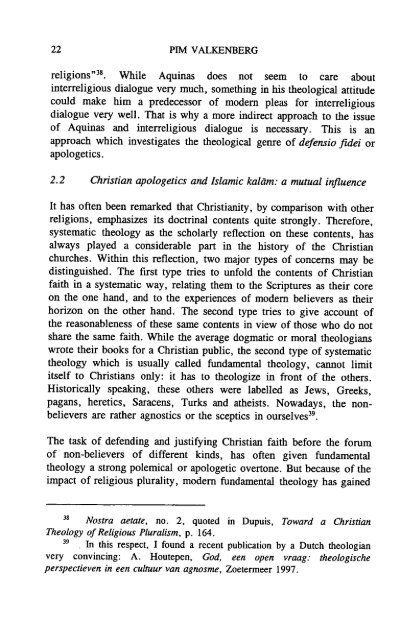Jaarboek Thomas Instituut 1997 - Thomas Instituut te Utrecht
Jaarboek Thomas Instituut 1997 - Thomas Instituut te Utrecht
Jaarboek Thomas Instituut 1997 - Thomas Instituut te Utrecht
You also want an ePaper? Increase the reach of your titles
YUMPU automatically turns print PDFs into web optimized ePapers that Google loves.
22 PIM VALKENBERG<br />
religions=", While Aquinas does not seem to care about<br />
in<strong>te</strong>rreligious dialogue very much, something in his theological attitude<br />
could make him a predecessor of modem pleas for in<strong>te</strong>rreligious<br />
dialogue very well. That is why a more indirect approach to the issue<br />
of Aquinas and in<strong>te</strong>rreligious dialogue is necessary. This is an<br />
approach which investiga<strong>te</strong>s the theological genre of defensio fidei or<br />
apologetics.<br />
2.2 Christian apologetics and Islamic kaläm: a mutual influence<br />
It has of<strong>te</strong>n been remarked that Christianity, by comparison with other<br />
religions, emphasizes its doctrinal con<strong>te</strong>nts qui<strong>te</strong> strongly. Therefore,<br />
sys<strong>te</strong>matic theology as the scholarly reflection on these con<strong>te</strong>nts, has<br />
always played a considerable part in the history of the Christian<br />
churches. Within this reflection, two major types of concerns may be<br />
distinguished. The first type tries to unfold the con<strong>te</strong>nts of Christian<br />
faith in a sys<strong>te</strong>matic way, relating them to the Scriptures as their core<br />
on the one hand, and to the experiences of modem believers as their<br />
horizon on the other hand. The second type tries to give account of<br />
the reasonableness of these same con<strong>te</strong>nts in view of those who do not<br />
share the same faith. While the average dogmatic or moral theologians<br />
wro<strong>te</strong> their books for a Christian public, the second type of sys<strong>te</strong>matic<br />
theology which is usually called fundamental theology, cannot limit<br />
itself to Christians only: it has to theologize in front of the others.<br />
Historically speaking, these others were labelled as Jews, Greeks,<br />
pagans, heretics, Saracens, Turks and atheists. Nowadays, the nonbelievers<br />
are rather agnostics or the sceptics in ourselves'",<br />
The task of defending and justifying Christian faith before the forum<br />
of non-believers of different kinds, has of<strong>te</strong>n given fundamental<br />
theology a strong polemical or apologetic overtone. But because of the<br />
impact of religious plurality, modem fundamental theology has gained<br />
38 Nostra aeta<strong>te</strong>, no. 2, quo<strong>te</strong>d in Dupuis, Toward a Christian<br />
Theologyof ReligiousPluralism,p. 164.<br />
39 In this respect, I found a recent publicationby a Dutch theologian<br />
very convincing: A. Hou<strong>te</strong>pen, God, een open vraag: theologische<br />
perspectievenin een cultuurvan agnosme,Zoe<strong>te</strong>rmeer<strong>1997</strong>.








